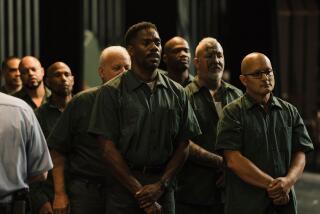This Play Was a Hard Cell
- Share via
Playwright Winsome Pinnock, one of the fast-rising talents of the British theater, is both cutting-edge and traditional. A 35-year-old Londoner with concerns as up-to-the-moment as the daily news, she’s part of a generation that came of age only to face the draconian social policies of Margaret Thatcher’s Britain.
Perhaps because of that, she’s also following squarely in the steps of some of the most highly regarded artists of the previous generation of British playwrights, among them Caryl Churchill, Edward Bond and David Hare. Unlike most American playwrights, these British dramatists revel in mixing topical, left-leaning politics with stage art.
Like these other playwrights, Pinnock cut her creative teeth at the Royal Court Theatre, the Sloane Square venue noted for bringing forth such seminal new plays as John Osborne’s 1956 “Look Back in Anger” and long regarded as a haven for the avant-garde. Nor has she strayed far from the concerns of the theater that gave her her start.
Pinnock’s latest work, titled “Mules,” tells stories of women who work as couriers in the international drug trade. Directed by Lisa Peterson, it opens Tuesday at the Mark Taper Forum as the last entry in the theater’s New Theatre for Now series, and was commissioned by the Clean Break Theatre Company and originally co-produced by Clean Break and the Royal Court in 1996.
“Mules” was shaped both by Pinnock’s feminism and the research she conducted among women prisoners in Jamaica and London. “I am really fascinated by women and crime,” says the elegantly composed and carefully articulate writer during a recent interview at the Taper.
“The thing that interests me about it is the relation of women to power, how women acquire power and what they do with it. It’s about their relationship to capitalism in a way.”
It’s a relationship that’s more complicated than she had initially suspected, she notes. “The notion I had of mules was that they were real victims,” says the playwright. “The thing that surprised me was that the women didn’t see themselves as that. Crime was actually a way in which they were trying to avoid being victims, to get out of poverty and give themselves some kind of a lifestyle.”
Peterson was attracted to the play’s social and political insights. “What I first responded to was its toughness, its clarity of political thinking,” says the director who staged a workshop production of “Mules” at the Taper’s ‘95-’96 New Work Festival.
“It has a Marxist point of view and a sense of humor, and it’s hard to find those two things together,” she continues. “What’s also unusual is that it’s a play about the abuse of power [in] a completely female world.”
*
Pinnock’s parents went to London from Jamaica in the late 1950s, part of a wave of West Indian migration. Her mother cleaned for a living and her father worked in a meat-packing factory; she is the third of four children.
Her working-class upbringing, however, didn’t deter Pinnock from having creative ambitions at a young age. “I wrote as a child even, little stories and things,” she says. “English was the thing I was always good at in school.
As an adolescent, Pinnock belonged to various drama groups and attended plays with her two sisters and other friends. In her teen years, she already was all but certain that she was headed for a life in the theater.
While studying drama and English at London University, Pinnock began to write plays. Then, after completing her studies, she joined the young writers’ group at the Royal Court Theatre.
She outgrew the group quickly, however. “I spent a couple of years there, and they said, ‘You should be writing and submitting now,’ and chucked me out of the writers group so I could get on with things on my own,” she recalls.
It didn’t take long. At age 25, Pinnock had one of her scripts, “The Hero’s Welcome,” given a reading at the Royal Court. And things just took off from there, with a number of productions at both the Royal Court and smaller London companies following soon after.
In fact, so direct was Pinnock’s career trajectory that she never had to bother with the mass mailings so familiar to beginning writers. “It wasn’t that difficult for me,” she says. “I only sent things to the Royal Court. I never thought to send them anywhere else.”
Pinnock’s plays “A Hero’s Welcome,” “A Rock in the Water” and “Talking in Tongues” were all produced at the Royal Court in the late ‘80s and early ‘90s.
In 1993, Pinnock was approached by the Clean Break Theatre Company, a small London-based touring group founded in 1979 by two women who at the time were incarcerated in Askham Grange prison. The company is committed to works that present issues of concern to female prisoners and former prisoners.
“They put on a play every year which is related to the prison justice system in England,” Pinnock says. “The plays are written specifically to tour prisons, and also to play a conventional theater venue.”
The offer the company made to Pinnock--a commission to support the writing of a work about female drug couriers or “mules”--was fortuitously timed. As it turned out, Pinnock had already been thinking about writing a play on the topic.
As one of the conditions of her commission, Pinnock agreed to a six-month residency with the company, during which she would teach creative writing to current and former female prisoners. It turned out to be a learning experience for both playwright and students.
“I wasn’t formally researching while I was teaching, but people would tell me things--about prison life, about crime, what they got out of it,” says Pinnock. “People would just volunteer things.”
It was also an emotional experience for Pinnock. “I found it quite harrowing, but I really liked the women I was working with,” she says. “They really wanted to write. I used to look forward to working with them.”
The second phase of her commission took her to Jamaica in 1994, where she met with women serving time for carrying drugs. “[The Jamaican prison authorities] allowed me to meet four women actually in prison at the time,” she says. “I wasn’t allowed to talk to them for very long,” in some cases less than an hour.
Greater obstacles were presented by the women themselves. “What is so difficult about researching in prison is that people don’t tell you the truth,” says Pinnock. “Because they’re in prison, what they tell you is conditioned by that. They’re usually so depressed at being caught.”
That depression was somewhat mitigated by the lighter sanctions imposed by Jamaican law. “In Jamaica, for trafficking, a woman might get 18 months, compared to a 10-year sentence in England,” says Pinnock. “So the women there were willing to talk to me.”
This was even more true of women who weren’t Jamaican nationals. “They were so far from home, they told me the truth,” says Pinnock. “I know that because the things they told me contradicted the things they said in court, and they told me how they lied in court. They were willing to tell the truth about why they made the decision to do what they did and what it was like.”
Pinnock continued her research when she returned to England, although with much less success. “With the research in England subsequent to that, I think the women have been less honest,” she says. “Almost all of them would say that they were tricked into it.
“Some of them were duped,” Pinnock continues. “A boyfriend will say, ‘Take this over for me,’ and it will be drugs, or some of them will know what they’re taking and do it because they’re in love with this guy. But most were just too knowledgeable about the whole business to have been tricked.”
For Pinnock, the greatest challenge in translating her research into drama was being faithful to her subject without betraying her sources. “The theater company I work for doesn’t allow you to base any of the stories on specific people you talk to,” she says. “I had to create characters out of my imagination, although the details of their lives came from the things that people had told me.”
When she’d completed a draft of the play, Pinnock sent it to the Royal Court. This was around the time she also had her first production at the Royal National Theatre (“Leave Taking” in 1995), and her stock was riding high.
The Royal Court decided to co-produce “Mules” with Clean Break, and the play was subsequently well-received in its 1996 premiere at the Royal Court.
“Winsome Pinnock’s racy and fascinating play opens with all the punch and pizazz of a Hollywood action movie, but hijacks those conventions to expose a sorry tale of exploitation,” wrote the Independent of London, echoing sentiments expressed by other publications.
Pinnock now is about to begin writing her first commissioned work for the National Theatre. She doesn’t know what the play will be about yet, except that it’s likely to be very different from “Mules.”
Yet “Mules” and the women she came to know along the way continue to linger in her thoughts--in no small part because of her glimpse of a parallel universe.
“I’m interested in people who have decided to belong to a different kind of world,” says Pinnock. “With a lot of people I met, there was a consciousness about being apart from the straight world, a contempt they had for it.
“It’s a strange, vicious circle in that they’re repelled by the straight world and yet somehow attracted to its values,” she continues. “Even while trying to escape that world, they end up exhibiting some of the worst attributes of that world in themselves: wanting more and more money and so on.”
In the end, however, Pinnock stops short of over-romanticizing her subjects. “It’s ultimately very sad,” she says. “A lot of the people I met were bright and obviously could make something of themselves. For whatever reason--whether it’s lack of opportunity or they just weren’t interested in doing anything else--they’re kind of being wasted.”
Nor is she naively optimistic about the possibilities for change.
“One of the women I spoke to said there will always be women to do this,” she says. “As fast as women are imprisoned, there are more women willing to take the risk.”
* “Mules,” Mark Taper Forum, 135 N. Grand Ave., downtown. Tuesdays to Saturdays, 8 p.m.; Sundays, 7:30 p.m.; Saturdays and Sundays, 2:30 p.m. $29-$37. Ends June 29. (213) 628-2772.
More to Read
The biggest entertainment stories
Get our big stories about Hollywood, film, television, music, arts, culture and more right in your inbox as soon as they publish.
You may occasionally receive promotional content from the Los Angeles Times.










